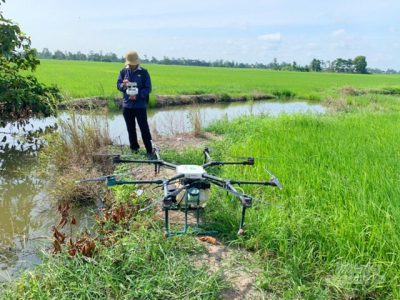Growing rice with smartphone

With just a smartphone, farmers can 'order' water pumping or grasp disease situation on rice fields wherever they are.
Using drone to spray pesticides. Photo: Le Hoang Vu.
Saving costs, increasing profits by 20%
For many years, Sen Hong (Pink Lotus) region in My Dong commune, Thap Muoi district (Dong Thap province) has been well-known as the first "idea rice-growing area" of the Mekong Delta with the application of alternate wetting and drying irrigation technique.
Through the application of cloud computing technology, farmers could pump or drain water with just a click of button on smartphone. Especially, all activities including seeding paddy rice and fertilizing were totally conducted by machines while drones were used to spray pesticides. As a result, farmers could save 50% of fertilizers, 70% of effort and could cut greenhouse emissions by 50% while rice yields rose by 30%, leading to an increase in farmers' income by at least 20%.
Particularly, the model has a close connection between production and consumption from input to output, making farmers feel secure. It's estimated that farmers can earn average profit of nearly VND20 million/ha/crop, VND4.3 million higher from conventional farmers.
Nguyen Van Khi, a member of My Dong 2 Cooperative said smart-rice farming could cut seed use from 12 kilos to 6-8 kilos. Bio-pesticides were used instead of chemicals and were sprayed by drones.
At first, many farmers remained skeptical about this model. However as they experimented with it they achieved success. They could harvest 7-7.5 tons of paddy rice/ha and could sell their rice at the higher prices compared with conventional farmers (an increase of VND400-500 per kilo).
Growing rice for decades, Nguyen Hoang Son, a member of My Dong 2 Cooperative said happily "My family has joined the cooperative and applied smart-rice farming techniques for two years. For me, farming is no longer hard work. Besides, we are no longer worried about selling paddy rice."
Ngo Phuoc Dzung, Director of My Dong 2 Cooperative said the cooperative was the pioneer in smart-rice farming. Since the 2017-2018 winter-spring rice crop it has cooperated with Rynan Smart Fertilizers Joint Stock Company (Tra Vinh province) to carry out the pilot model of smart-rice farming on 7.6 hectares.
In this model, farmers used smart fertilizers and modern paddy rice seeding machines which could conduct planting, fertilizing and spraying, thus saving money for fertilizers, pesticides and labor.
Water sensors were also installed to help farmers monitor water levels on rice fields. They could pump or drain water with just a click of button on smartphones. They also raised ducks to protect rice crops from pests.
Ngo Phuoc Dzung proudly said "We now have 108 members. Our rice-farming model is one of the most modern systems in the Mekong Delta. The outstanding features of the model are we control our fields by smart phones, using drones to spray pesticides. After harvesting, two-thirds of the cooperative's paddy rice has been bought for prices above the market.
Ngo Phuoc Dzung who has been working for the cooperative for more than 7 years, said "Amid climate change and fluctuating market, especially increasing agricultural material prices, farmers must change their mindsets to make rice farming profitable. Of course, these changes must be agreed upon by all members of the cooperative and be supported by the State's policies and mechanisms."
When smartphones replace manpower
The farmers of My Dong 2 Cooperatives have gradually applied Internet of Things (IoT) to control pest infestation on their rice fields.
Dzung explained while conducting water pumping on his smart phone “We installed a lot of sensors for our hundred-hectare rice farm and for some channel systems. These sensors will send information of water levels to the serve. The collected data will help farmers know when they should pump water in or out the fields”.
Farmers could quickly and exactly operate their farms via their smartphones. IoT system allows all data related to farming and agriculture to be updated all the time.
As long as there is internet connection the cooperative can know what is happening on farm. With just a smartphone, farmers are now able to deal with a lot of works even when they are at home which can save a lot of time and effort.
Apart from using IoT to automatically pump water, My Dong 2 Cooperative has applied smart monitoring model to control pests and diseases. The sensors and smart monitoring systems installed would help farmers promptly detect the density of pests on the fields to find the best solutions.
The system can give relatively accurate forecasts within five square kilometers. This monitoring system will change farmers’ routines. The data of pests and diseases will be sent to users’ smartphones on a daily basis.
Bui Van Son, Head of the Office of Agriculture and Rural Development of Thap Muoi district (Dong Thap) said the application of multi solutions such as mechanization, IoT and drone has allowed My Dong 2 Cooperative to cultivate rice more conveniently. These advanced technologies have not only helped the cooperative save money but also have improved the quality of rice.
Related news
 Strengthening the role of structural and non-structural measures in the Mekong Delta
Strengthening the role of structural and non-structural measures in the Mekong Delta Both structural and non-structural measures have played an important role in the comprehensive and sustainable development of the Mekong Delta making
 Rambutan and organic compost from rambutan peel - The dual benefits
Rambutan and organic compost from rambutan peel - The dual benefits Organic compost made from rambutan peels can put this agricultural waste to maximum utility, reducing the impact of environmental pollution.
 Dual benefits from agricultural by-products
Dual benefits from agricultural by-products With tens of tons of agricultural by-products discharged every year, a business has used them to compost microbial fertilizers for plants and produce clean